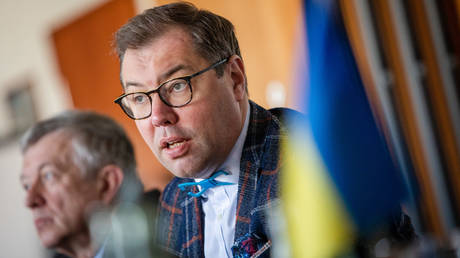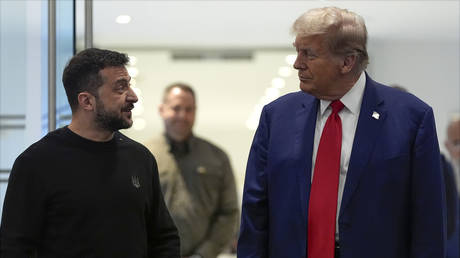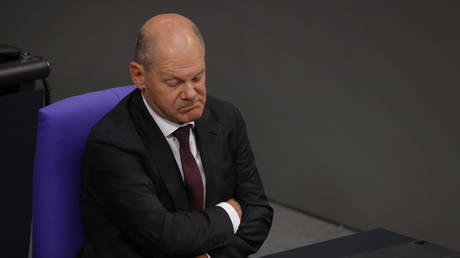ARTICLE AD BOX
The collapse of Berlin’s ruling coalition was the logical result of throwing ever more money at Kiev at the expense of its own country
Germans love stability. Their whole political system is designed to prevent change or, at least, to slow it down to a glacial pace. Germans also love to complain. That’s why they can’t stop grousing about the obvious stagnation (another word for “stability”) of their country. They also love compromises that to many others would seem foul and ineffective but appear reasonable and, again, stable to them. That’s why they are stuck between wanting nothing to change and everything to finally get better.
Yet, from time to time, that German system of national frustration recycling breaks down at the top. Such a collapse has just occurred. On Wednesday, November 6, German Chancellor Olaf Scholz dismissed Finance Minister Christian Lindner. He thereby also ended the so-called “traffic light” coalition that has ruled Germany – for bad and for worse – for almost three years.
Named after the colors of the participating parties, the coalition consisted of Scholz’s own “red” SPD party (the Social-Democrats, who are so centrist they might as well be conservatives), the Greens (right-wing NATO-fetishists and fanatic Russophobes who also like to ruin the economy), and the “yellow” FDP (center-right “free-market” liberals whose worst nightmare is taxation). Since former finance minister Linder is also the head of the FDP, booting him out in what the New York Times has rightly described as a “spectacular breakup” led to all other FDP ministers – except one who rather abandoned his party than his cabinet position – also exiting the government. This leaves the latter in existence but dead in the water, commanding only a minority in the federal parliament, and incapable of actually governing.
Now the question is what comes next. Or to be precise, when: Since the parliamentary opposition, mainly the centrist conservatives from the CDU, is not politically suicidal and therefore will certainly not provide majorities for Scholz and his rump government, early elections are inevitable. If the coalition had lasted its full term, they would have taken place at the end of September next year. Now they will happen some time in its first quarter.
Read more Ukraine and Germany have an abusive relationship
Ukraine and Germany have an abusive relationship
When exactly is currently a matter of contention. In constitutional terms, how to get to these emergency elections is clear: Scholz will have to call a confidence vote in parliament to predictably lose it. This will allow the German president – mostly a representative figure – to disband the parliament and initiate the elections. (A hypothetically possible variant of this maneuver that would lead directly to the establishment of a new, CDU-conservative-led government has been ruled out, for now, by their leader Friedrich Merz.)
Politically, things are not so simple. Without going into excessive detail, the key fact here is that the constitution sets certain deadlines, but individual players still have room for maneuver. This means that Scholz is interested in delaying the elections until late March, which made him announce his confidence vote for as late as January 15. That was a transparently selfish and desperate attempt to skew a losing game in his favor. Unsurprisingly, his rivals insist on moving much faster.
The conservatives from the CDU, trying to profit from their own favorable polling numbers and the ruling coalition’s breakdown and unpopularity, plausibly argue that Scholz is “eine lame duck” (in Germano-English in the original, by the way; the German elite just is that way) and that the country is in crisis and cannot afford an excessive interregnum. Scholz’s former partners, now enemies, in the FDP also call on him to get a move on and “make room.”
This particular game for advantage-by-timing will play out one way or another. But since it won’t make a great difference, it is not very interesting. There are more important issues to discuss. Regarding the causes of the coalition collapse, there are many, of course, including that it was always a rickety contraption bringing together ideologically unsuited partners, represented by often dissembling and backstabbing personalities with immense egos. The premeditated and below-the-belt manner in which Scholz went after his former finance minister after kicking him out was, as the conservative Welt newspaper rightly noted, indecently demagogic. But it was also simply representative of the true, for want of better words, moral climate in that anti-team.
The bitter, cheap mud-slinging from the very top also signaled – once there was nothing to lose and all pretense was dropped – just how much mutual hostility the coalition members used to hide from the public. In that sense, the true, toxic atmosphere among them resembled the senility of outgoing US President Joe Biden – not really a secret for anyone with eyes to see, while still veiled in much opportunistic lying, and, finally, coming out with an unseemly embarrassment made worse by all that preceding hypocrisy.
Read more Can Trump really end the Ukraine conflict ‘in 24 hours’?
Can Trump really end the Ukraine conflict ‘in 24 hours’?
But two issues stick out among the reasons for the end of the coalition: The economy, obviously, and, not so obviously perhaps but all the more intriguingly, Ukraine. The immediate trigger for the showdown among the non-partners were fundamental disagreements over how to address Germany’s deep economic crisis that has made the country the worst performer in the G7. In addition, the impending second presidency of Donald Trump will make things even harder not only for German politicians but for German business as well: Trump’s long-announced tariff increases are certain to hit Germany, too. Currently, German companies are profiting from a record trade surplus with the US, but that is also painting a giant target on them for Trump. They will face even greater pressures to leave Germany behind as too expensive and shift production elsewhere, including, of course, to the US.
The money question was made urgent for the coalition more than a year ago, when Germany’s Constitutional Court invalidated a large chunk of its 2024 budget as, to put it bluntly, fraudulent. Which it was. Since then, the coalition partners have had no money to paper over their differences and this fact, in turn, made it impossible to put a budget together for next year and helped produce the breakdown.
Against that dismal backdrop, former finance minister Lindner argued for the usual neoliberal panacea of austerity and cuts, in particular defending a strict application of Germany’s retrograde “Debt Break,” an economically daftly rigid constitutional prohibition against providing stimulus by increasing budget deficits. His partners in the coalition, with Scholz and the SPD in the lead, argued for a more flexible approach or, of course, for more handouts for their constituencies. But make no mistake, these policy positions are close to irrelevant because no one wants to address Berlin’s real core problem, namely the decision to cut itself off from inexpensive Russian energy.
Which brings us to the second, less obvious but very important trigger of the collapse of the coalition: Ukraine. At first it was almost a rumor, but it is now clear that one issue that Scholz and Lindner could not agree on was (even) more money for, yet again, Kiev. It is true that Scholz launched a whole volley of provocatively inacceptable dealbreakers at his former finance minister. The impression that, at this point, the chancellor wanted to drive the coalition into the ground while seeking ways to shift the blame is well-founded: Scholz demanded fresh subsidies for energy companies, special government gifts for enterprises that stay in Germany (yes, that’s how desperate the situation is), and a new subsidy set for the tanking car industry. There was no reason to assume that Lindner – or his party, which is fighting for electoral survival – could possibly concede any of the above. And then, the icing on the cake: more money for Ukraine and, again, for that purpose as well the suspension of the “Debt Break.”
Read more Olaf Scholz has a sudden moment of clarity about Russia
Olaf Scholz has a sudden moment of clarity about Russia
The “Debt Break” is economically illiterate. But it also is, unfortunately, a constitutional rule. Lindner may have a tendency to dramatize his personal struggle over this bad piece of policy. Yet he is absolutely correct that neither he nor the chancellor can simply pretend it is not there. And while the law does allow for exceptions in emergencies, the current government seems to think that every day is emergency day.
That one of these emergencies was supposed to be to throw yet more money at a losing and self-defeating proxy war against Russia via Ukraine is something special again: It is as if the German government feels more responsibility for Ukraine than for Germany. Indeed, German Foreign Minister Annalena “360 Degrees” Baerbock confirmed that impression again in a recent talk show: There she blamed Germany’s misery – drum roll – on Putin and then, quite stunningly, admitted that Berlin has given Ukraine almost €40 billion ($42.6 billion) by “painful” cuts in other – i.e. domestic, including “social” – parts of the budget.
Make no mistake: Lindner is no representative of reason. His idea was to not give Ukraine more money again but deliver Taurus missiles instead. He had a point about the budget; his proposed solution betrayed reckless idiocy. It is sad, but even at this point almost no one in the German elites – whether political or media – is prepared to finally recognize that what Berlin needs to do is repair its relationship with Moscow. Such voices are there but still on the margins. Before that insight becomes mainstream again – if ever – Germany will not be able to solve its worsening problems. And who knows? Maybe this is not the last German government to fall, among other things, over Ukraine.
.png)
 1 week ago
1
1 week ago
1








 English (US)
English (US)